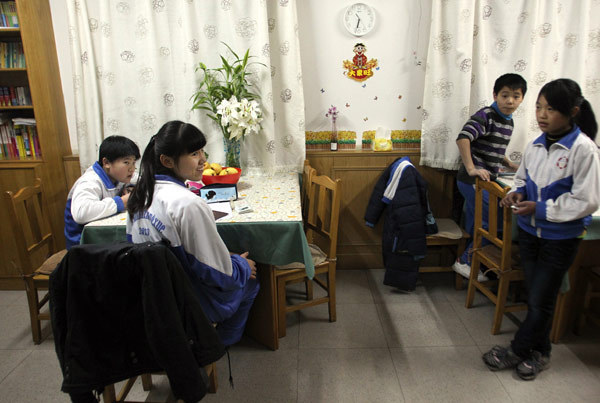NGO ends SOS on funding
Updated: 2014-01-02 00:47
By HE DAN (China Daily)
|
|||||||||||
 |
|
Each family at Tianjin SOS Children's Village has five to eight children, who refer to each other as sisters and brothers. Zou Hong / China Daily |
As the clock on her kitchen wall struck 6 pm, Li Jiao was busy making pumpkin pancakes, the last of four dishes for her six "children".
"I love being with children, especially the very young, who depend on me as if I were the whole world to them," said Li, a slender woman in her 30s.
Worried about food safety, she grows corn and vegetables at the SOS Children's Village in Tianjin.
The former kindergarten teacher left her hometown in Hubei province to become a "mother assistant" about three years ago.
She was a perfect candidate for the job — single (she is divorced) with no children.
China introduced the family-based care model from SOS Children's Village International, a non-governmental organization originating in Austria, in 1984. It is based on single women taking care of healthy orphaned or abandoned children.
There are 10 SOS Children's Villages on the Chinese mainland, employing more than 140 SOS mothers and about 50 mother assistants.
However, it is uncertain whether Li and other caregivers will be able to continue their work, as SOS Children's Village International plans to end its funding to China in 2016.
Matthias Scholz, a spokesman for the NGO, blames difficulties in fundraising in major Western donor countries due to the lingering global economic crisis as a major reason for its withdrawal.
He also points to the strengthened finances of the Chinese government amid the nation's rapid economic development.
"During the past few years, the Ministry of Civil Affairs has been progressively more involved in the implementation of policies, and taken on greater responsibilities in the framework of our partnership," Scholz wrote in an e-mail to China Daily. "This has led us to the conclusion that the Chinese authorities will shoulder virtually all the financing for our current programs."
Li Jinguo, director of SOS Children's Villages China, said restrictions on public fundraising activities for overseas charitable organizations on the Chinese mainland were the final factor in international organizations' decision to stop treating China as a recipient.
The international organization signed a contract with the Ministry of Civil Affairs in 1984.
Under this, it pays all caregivers' salaries and benefits, maintenance, living expenses of caregivers and children and other daily operating expenses in the villages. Local governments offer land and pay for executive staff in each village.
Li Jinguo said SOS has reduced its spending on Chinese projects since 2008.
SOS Children's Villages International has allocated about 591 million yuan ($97.3 million) for the 10 villages on the mainland since cooperation started in 1984, the Ministry of Civil Affairs says.
The ministry recently held a meeting to discuss funding and other possible changes to SOS Children's Villages in China. The meeting was presided over by two deputy ministers.
It ended with consensus to "strive to solve the current problem and make the operating and nursing model more localized", according to a written reply China Daily received on Wednesday.
The ministry is considering the provision of cost of living subsidies for orphans in the 10 villages and earmarking funds from annual welfare lottery revenue and other possible channels to sponsor the villages if needed, the reply states.
Li Jinguo said, "I don't want to see the government taking over all SOS Children's Villages in China, as it means we risk losing our unique identity and will turn into a State-run welfare institution."
He said civil affairs authorities closed hundreds of privately run organizations dedicated to helping vulnerable children after a fire in January last year killed seven at an unregistered orphanage in Lankao, Henan province.
Tong Xiaojun, a professor specializing in child rights at China Youth University for Political Sciences, said the SOS Children's Village model has clear advantages for children's development when compared with most orphanages.
"The interaction with family members and the local community is vital for a child's growth, and SOS Children's Villages allow vulnerable children to regain the opportunity to live in a family environment," she said.
SOS Children's Villages China said about 40 percent of children who grew up in these villages went to universities, including 19 who went abroad for further education.
"Most of our children found work and got married after they left our villages," Li Jinguo said.
Related Stories
784 students left in coldness after power cut off 2013-12-26 17:28
Program returns 256 homeless children to schools 2013-12-25 21:28
Take care of abandoned children together 2013-12-25 16:26
Children forced to take adult medication 2013-12-25 09:37
Video shows violent kindergarten teacher 2013-12-20 19:20
Today's Top News
Putin meets Volgograd bombing victims
Diplomacy to focus on neighborhood
Former Israeli PM Sharon's health deteriorates
NGO ends SOS on funding
Palestinian envoy in Prague killed
Abe's policies to boomerang
Kim seeks ROK ties, warns US of nuclear 'disaster'
Putin vows to annihilate 'terrorists' after bombings
Hot Topics
Lunar probe , China growth forecasts, Emission rules get tougher, China seen through 'colored lens', International board,
Editor's Picks

|

|

|

|

|

|





